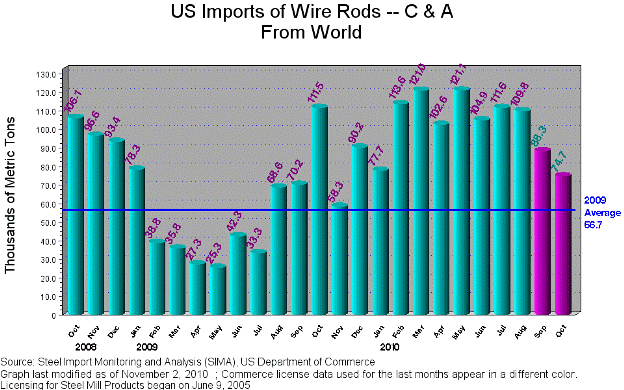In reaction to higher scrap costs, domestic mills might be able to firm up soft spot prices with an official price increase; however, current demand doesn't support such a move.
Before November scrap pricing was announced last week, spot prices for domestic wire rod lagged behind official asking prices of $31.50-$32.50 cwt. ($694-$717/mt or $630-$650/nt) ex-mill. Most transactions have been concluded in the lower end of the range, with some exceptionally large orders even heard at $30.00 cwt. ($661/mt or $600/nt) ex-mill or slightly under. Because domestic wire rod prices are still considered highly negotiable, it is unlikely that mills will push for a price increase in response to the $20/long ton rise in shredded scrap. However, mills such as Nucor have raised prices on other long products suffering from low demand-rebar and merchant bar in particular-so there is a chance that wire rod mills will throw a higher price out there just to see if some of it will stick, or if they can at least firm up the softest spot deals. But according to wire rod customers, mills shouldn't count on it.
To bolster their argument, customers point to demand levels, which have not necessarily worsened, but have also not improved much in the last few months. Automotive-the relatively steady bright spot-is still keeping the market afloat, along with consumer wire items found on retail shelves. But construction activity is still frustratingly slow, bringing down demand for downstream wire products such as mesh and nails. The fencing market is also in the doldrums, with many fencing companies reporting not much improvement on the horizon in 2011.
The one thing that domestic wire rod mills have in their favor, for the time being at least, is the downtrend in import activity. Turkish wire rod remains too pricey for serious consideration, but Turkish mills are reluctant to drop prices while their own scrap costs are rising. In fact, export offers reported out of Turkey seem to be on the brink of increasing, which should translate into higher purchase prices in the US by as early as next week. For now, however, import offers are the same as last week, in the range of $29.75-$30.75 cwt. ($656-$678/mt or $595-$615/nt) duty paid FOB loaded truck in US Gulf ports.
Turkey's prices have been unattractively high for months, which partially explains why wire rod imports into the US from Turkey have been on a steep downtrend since the end of summer. According to data from the US Import Monitoring and Analysis System (SIMA), the US imported 27,590 mt of wire rod from Turkey in August (census data), followed by 12,546 mt in September (preliminary census data) and a drastic drop down to 854 mt in October (license data). Overall import activity has followed a similar, if not as dramatic pattern. License data show that total wire rod imports into the US in October totaled 74,780 mt, down from 86,010 mt in September.
Like Turkey, almost every source of imported wire rod showed a drop in tonnage, except for a curious few. Japan exported 15,203 mt of wire rod to the US in October, over twice the September total of 7,826. The United Kingdom also significantly boosted wire rod exports to the US, with 8,158 mt in October compared to 1,581 mt the prior month. Wire rod from Korea also increased significantly, from 137 mt in September to 5,326 mt in October. But the primary sources that the US depends on most, Canada, Turkey and Mexico, all shipped substantially less to the US last month, and considering current import prices, the overall downtrend in import activity is likely to continue.
